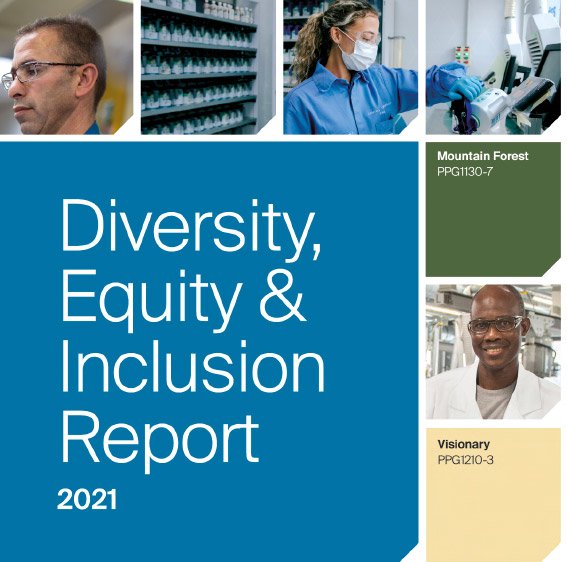PPG Industries Policies for Diversity, equity, and Inclusion

03-07-2023
PPG Industries’ comprehensive perspective on diversity encompasses various aspects such as gender, race, ethnicity, sexual orientation, disability/ability, religion, nationality, educational experiences, and other dimensions. The unique viewpoints of employees empower the company to tackle challenges swiftly, creatively, and effectively, which gives a significant competitive edge in today’s global economy.
Inclusive and fair cultures enable diverse teams to thrive and excel. Embracing diversity, equity, and inclusion (DE&I) is not only a strategic move for a company’s business but also the morally right thing to do on multiple levels. PPG is fully dedicated to nurturing a diverse, equitable, and inclusive environment every single day.
To emphasize commitment, Michael McGarry, the Chairman and CEO of PPG, was among the initial 150 signatories of the CEO ACTION FOR DIVERSITY & INCLUSION® pledge in 2017. This coalition, which is now the largest CEO-driven business alliance, comprises over 1,600 companies that are actively promoting diversity and inclusion in the workplace.
In 2020, the company’s intensified its focus on DE&I throughout the company. Through these initiatives, PPG introspected and analyzed culture, workforce, and workplace, leading to a series of commitments to foster the growth and reinforcement of DE&I.
In November 2020, PPG appointed Marvin Mendoza as the global head of DE&I. In this newly established role, Mendoza assumes the responsibility of developing, leading, and implementing global DE&I vision and strategy. He also utilizes data-driven insights to expedite company’s DE&I agenda.
The company has also bolstered and expanded employee resource networks (ERNs). By conducting listening sessions with employees and seeking external guidance on exemplary ERN programs, the company created a new structure that offers more opportunities for employees to engage in conversations, learn from one another, and leverage their distinct skills, experiences, and perspectives. These efforts are aimed at cultivating a more inclusive work environment.
To support and foster the success of PPG Industries ERNs, the company assigned executive sponsors from the PPG Operating Committee. Furthermore, ERNs serve as platforms for in-depth discussions, focused efforts, and recommendations on how they can achieve higher growth and performance by building a more diverse, equitable, and inclusive organization. Furthermore, they provide employees with an amplified voice and additional avenues, ensuring that DE&I becomes an integral part of the business practices.
In order to expand the diversity of talent pools, PPG and the PPG Foundation are actively investing in educational opportunities for the next generation of innovators. The company goal is to engage with diverse students and communities, driving positive change and empowering historically underrepresented populations
For instance, in the United States, PPG plays an active role in the National Society of Black Engineers (NSBE®). This involvement includes participating in the NSBE’s Board of Corporate Affiliates, Annual Career Fair and Convention, as well as regional conferences. Additionally, the PPG Foundation provides grants to support NSBE’s SUMMER ENGINEERING EXPERIENCE FOR KIDS® (SEEK) camp, and interns volunteer at these camps for at least one day. In 2020, the intern class consisted of 41% female participants and 37% individuals from racially and ethnically diverse backgrounds.
Furthermore, in 2020, approximately 33% of company’s professional hires worldwide were women. While previous efforts have primarily focused on increasing female representation, new initiatives will also enhance PPG endeavours to attract, hire, and promote employees from underrepresented groups.
PPG Industries has achieved a 90% rating on the 2021 CORPORATE EQUALITY INDEX® (CEI) by the Human Rights Campaign Foundation. This index serves as a nationwide evaluation and report on corporate policies and practices regarding LGBTQ workplace equality. One notable example is Workplace Gender Identity and Transition Guidelines, which specifically cater to the needs of transgender employees. These guidelines are designed to ensure their safety, fair treatment, promote their seamless integration into the workplace, and reduce any instances of stigmatization
